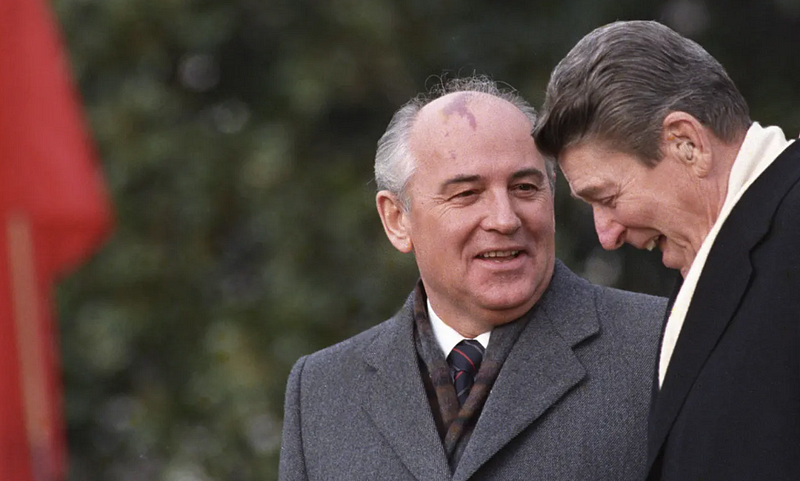
*This story was originally published in The Post-Standard:
https://www.syracuse.com/opinion/2022/09/why-well-miss-mikhail-gorbachev-guest-opinion-by-sharon-werning-rivera-david-w-rivera.html
On August 30th, one of the great men of the twentieth century passed away at the age of 91. Mikhail Gorbachev, the last General Secretary of the Communist Party of the USSR, was both adored abroad and reviled at home. What is indisputable, however, is that his impact on the course of history was immense.
One of Gorbachev’s most significant achievements was the flowering of political and individual liberties during his rule. Before he came to power in 1985, the democracy-monitoring organization Freedom House assigned the USSR its lowest possible scores for political rights and civil liberties. After the launch of his program of systemic reform, however, intellectual, political, and religious freedom blossomed (and the country’s scores improved dramatically). He released political prisoners, and his policy of glasnost (which in practice equated to greatly expanded freedom of speech) became a word known worldwide.
Even more consequential was Gorbachev’s genuine commitment to lifting the burden of militarism from the shoulders of Soviet citizens and establishing a lasting peace between the rival superpowers. Thanks to his reversals of policies that had been Soviet mainstays for decades, the arms race was curtailed, the Soviet Union withdrew its troops from Afghanistan, the Berlin Wall came down, and the Cold War came to end. Even though these outcomes meant that the liberal democratic world essentially won that war, Gorbachev did not reverse course in the face of that uncomfortable reality. Both the Nobel Peace Prize that he received and Time magazine’s selection of him as its “man of the decade” were richly deserved.
By the time we arrived in Moscow in 1994 for what would be a multi-year stay, however, Mikhail Gorbachev had been out of power for over two years and his star had faded to a flicker. He was wildly unpopular for presiding over an economic crash and (by hardline communists and nationalists) for both the loss of great power status and allegedly “giving away” the empire. In short, the post-communist Russian political scene had absolutely no use for him. Indeed, when he vainly ran for president in 1996, he received less than one percent of the vote.
Shut out of power, all the former Soviet leader could do was head a small academic institution possessing a modest budget and facilities. The Gorbachev Foundation’s academic seminars were poorly attended, but this provided a benefit to us since it meant that we were able to sit around a medium-sized conference table just a few feet from the former Soviet leader. Perhaps unsurprisingly, his comments at those events were frequently defensive. For instance, we remember him defending the Soviet withdrawal from Eastern Europe by saying: “I am regularly castigated for ‘giving away Bulgaria,’ ‘giving away Hungary,’ ‘giving away Czechoslovakia,’ etc. But to whom did I give them away? To the Bulgarians, to the Hungarians, and to the Czechs.”

As scholars of Russia, we greatly miss Gorbachev on a personal level. In the Moscow of the mid-1990s, one of us could openly interview members of parliament and the federal bureaucracy, and the other could work as the founding director of a Harvard-affiliated research center that was dedicated to promoting ties and cooperation between Russian and American scholars. In fact, a core part of the center’s mission was to distribute research grants to Russian scholars so that they would be less inclined to seek employment abroad. In the Russia of today, where one can go to jail merely for describing the current Russo-Ukrainian war as a “war,” such activities would result in a Russian being labelled as a “foreign agent.” In fact, in 2014, one of us was harassed by journalists working for state-run television just for teaching at a summer school. We are unsure whether we will ever be able to travel to Russia again.
Of course, Gorbachev was in no way a perfect leader. At his foundation’s events, we often heard him often lament the dissolution of the USSR and, in particular, Ukraine’s achievement of independent statehood. On the one hand, his intuition that this outcome had opened up a “Pandora’s box” that could one day lead to war has proven prescient. On the other hand, he mistakenly placed most of the “blame” for the dissolution of the Soviet Union not on the desire for independence on the part of the USSR’s non-Russian nations, but rather on Russia’s first post-communist president, Boris Yeltsin, who had actively sided with their strivings for greater sovereignty. With the benefit of hindsight, we can see that Yeltsin pursued the enlightened policy and Gorbachev, by being willing to use military force to deny those nations the right to self-determination, was on the wrong side of history.
Nevertheless, the treatment that Russian society gave him in the 1990s — and still affords him — is not deserved. His domestic reforms certainly did not succeed as intended, but the reality is that he moved his country along a path and toward an outcome that was unavoidable in the long- and even medium-run. Delaying the day of reckoning would have only made things worse. Moreover, as we all have vividly seen on our television screens since Russia launched its invasion of Ukraine in February, the world is still in need of peacemakers like Gorbachev. In fact, the citizens of both Russia and Ukraine would be far better off if Gorbachev were sitting in the Kremlin today.
















